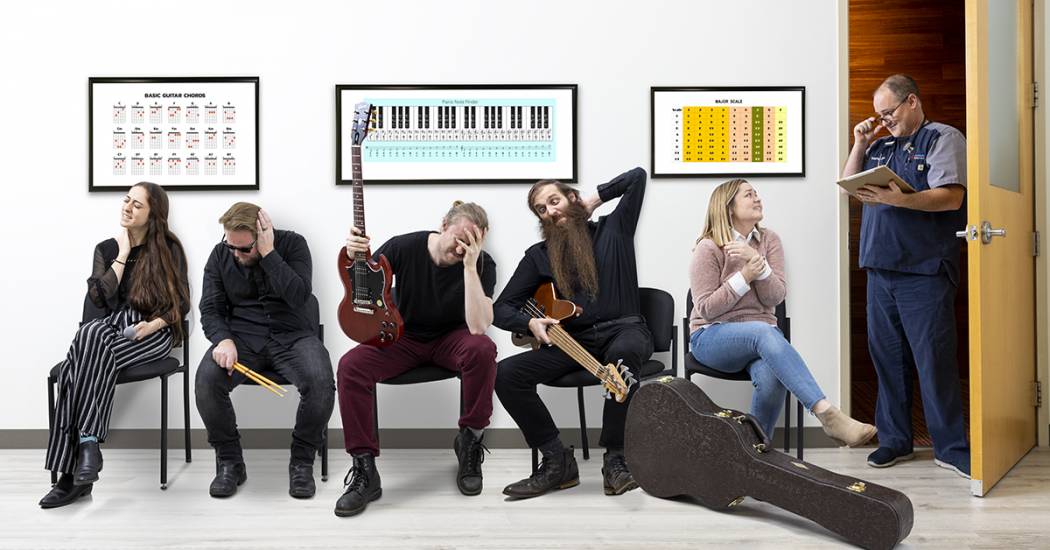
I have the best job in the world as a doctor who takes care of a few thousand Sweetwater employees! Since I have a very musician-focused practice, it’s been very interesting to see how not only the mix of injuries is different but also the ways to deal with them. Particularly interesting is how a musician’s needs are unique due to their involvement in the arts. Let’s talk about five fairly common ailments I see and how to manage them.
Hearing Loss
This gets mentioned first because it’s the most devastating in the long term. Why? Because once you notice it, you’ve already missed your window to do something about it; and, worse yet, it’s 100% preventable. Nonetheless, if an older (well, let’s say “more seasoned”) musician was going to talk to a room full of teenagers and warn them to protect their hearing now, 99% of the teenagers wouldn’t take the advice seriously because it just seems like something that is far “down the road.” The problem, though, is that the damage is being done from early on and is cumulative over time.
We all love the “thump” of being immersed in a live concert experience — feeling the music is mostly why you go, but that faint (or not so faint) ringing you hear on the way home and the next morning? That’s the sound of your nonreplaceable auditory sensors crying out in pain. Wear ear protection when you are around any sound that is over average levels. For a more detailed discussion on protecting your hearing, see this: “The Musician’s Guide to Hearing Protection — from a Doctor!“
Hand and Wrist Injuries
These are commonplace to instrumentalists — pianists, guitar players, drummers, string players, wind instrumentalists. They all require repetitive movements and oftentimes long rehearsals, practice time, and performances that can become quickly debilitating. Much like hearing loss, these kinds of issues are almost entirely preventable with some diligence. Be mindful of pain — your body hurts for a reason. While you can expect some pain as part of developing muscles for a bodybuilder, this is not the same at all for a musician. Data shows that more than 90% of all instrumentalists will experience some kind of pain or injury directly related to the use of their instrument, and the peak incidences are for those in their 20s (when many musicians are immersed in perfecting their skills) and in their 50s (when aging tends to start slapping us in the face and reminding us that we’re not 20 anymore).
The key to minimizing these injuries is recognition and adjustment. The sooner you identify that something doesn’t feel right and you adjust, the less serious it will likely become. Be sure to take time to stretch and learn proper technique, and if symptoms are recurring and you can’t figure out why, then get evaluated sooner than later in the process; and be sure to see a medical professional that understands the unique needs of an instrumentalist.
Vocal Strain
The voice, as an instrument, requires just as much attention and deliberate care as an instrument you play with your hands. We’ve all read stories of famous singers having tours, or even careers, derailed because of vocal issues. Unlike hearing loss, though, once symptoms appear, there are often solutions, although they can take a lot of time and expense to address.
As such, prevention is critical. This is one area where seeing a professional early on is important — whether that is a vocal coach who is well versed in proper technique or an ENT who is well qualified to evaluate the singing voice — as vocal issues can be hard to sort out just by doing a Google search or by watching YouTube videos. Don’t let symptoms linger and hope they get better. The key to avoiding most vocal issues is simply some routine maintenance and practice.
Back Injuries
You have your ear protection in place, you’ve diligently warmed up your voice and your body in preparation for your gig, but you still have load-in to accomplish, and it’s been a long day already. You’ve barely had time to grab a bite to eat, and now you’re late; and, as you grab your 70-pound bass amp out of the back of your van, you feel a twinge in your back. By the time the first song starts a few hours later, you’re not even sure you can stand for another 10 minutes, much less through the whole set.
Back injuries are common and very disruptive. Sometimes the cause is obvious, sometimes it happens just picking up a piece of music off the floor; but, either way, it can throw you off your game for a while. A little prevention goes a really long way. Being careful to control your weight and diet is important, but also stretching to keep your back musculature in good alignment is critical as is core muscle strengthening. This is one area where YouTube can be super helpful as back-maintenance exercises and stretches are pretty straightforward. However, if you have ongoing issues despite doing those basics, then be quick to get things evaluated by a professional to avoid long-term issues, especially if you find particular symptoms are recurring.
Stress
Wait, stress isn’t an injury! Well, hear me out. Stress is very often the one common thread to any kind of injury I see among musicians — we are all diligent when it comes to our craft, and yet we are often blinded when things that are disruptive encroach on our routines. When life starts getting away from us because of the pressures of our day jobs, our relationships — any number of reasons — the first thing to slip is your dedication to adequate sleep. Then fatigue sets in, you start getting lazy with your diet, and, before you know it, you’ve skipped a few trips to the gym and you’re “suddenly” all out of balance.
Life can unravel like a cheap sweater if you let a loose thread hang too long, so be vigilant to recognize when you are making compromises while burning the candle at both ends before you see the physical ailments start rearing up. Sometimes the best treatment can be a very deliberate break to get some much-needed rest and to reset your diet and expectations. I can’t emphasize this enough.
So, there you have it — five things most commonly seen among musicians from a family doc’s perspective. This is by no means exhaustive, but I hope perhaps there’s a nugget in here that you can take away that will help you move ahead more quickly (and healthier!) as you reach for your musical dreams!


